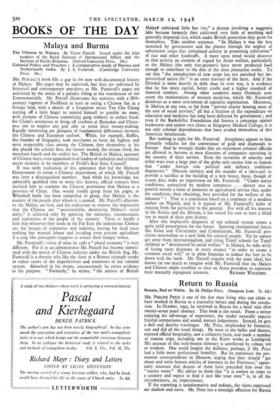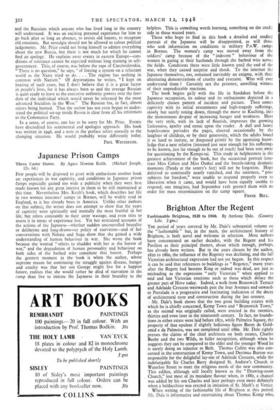Return to Russia
Russia, Red or White. By M. Philips Price. (Sampson Low. 7s. 6d.) MR. PHILIPS PRICE is one of the few men living who can claim to have worked in Russia as a journalist before and during the revolu- tion. In October, 1945, he returned to Russia for a brief visit after twenty-seven years' absence. This book is the result. From a writer enjoying his advantage of experience, the reader naturally expects fruitful comparisons and sound, mature judgements. Instead, he gets a dull and sketchy travelogue. Mr. Price, shepherded by Intourist, saw and did all the usual things. He went to the ballet and theatre, enjoyed official hospitality, saw a collective farm, and made a number of routine• trips, including one to the Kirov works at Leningrad. His account of this well-beaten itinerary is unrelieved by colour, wit or wisdom. One could forgive the dullness, perhaps, if Mr. Price had a little more professional humility: But he patronises the per- manent correspondents in Moscow, urging that they should " get about and write feature articles of journeys to the Provinces," appar- ently unaware that dozens of them have preceded him over the "tourist route." His advice to them that "it is useless to come to a country and expect to find it just like your own" is, in all the circumstances, an impertinence.
If the reporting is uninformative and tedious, the views expressed are shallow and naive. Mr. Price has a nostalgic affection for Russia and the Russians which anyone who has lived long in the country will understand. It was an exciting personal experience for him to go back after so long an absence, to revisit old haunts, to recapture old emotions. But nostalgia should not be allowed to colour political judgements. Mr. Price could not bring himself to admire everything• about the new Russia, but there is not much for which he cannot find an apology. He explains away events in eastern Europe—con- ditions of tolerance cannot be expected without long training in self- government. This, of course, was before the rape of Czechoslovakia. " There is no question," he says, " of forcing a system on a reluctant world as the Nazis tried to do. . . . The regime has nothing in common with Nazism." Of deportations he writes, " I kept on hearing of such cases, but I don't believe that it is a great factor in people's lives, for it has always been so and the average Russian is quite ready to leave to the executive authority powers over the free- dom of the individual which would never be tolerated by the most advanced Socialists in the West." The Russian fox, in fact, almost enjoys being hunted. That the author has not even begun to under- stand the political set-up inside Russia is clear from all his references to the Communist Party.
In a sense, of course, one has to be sorry for Mr. Price. Events have discredited his sentimental and apologist approach. His book was written in 1946, and a note in the preface refers uneasily to the changing situation. He would probably write differently today.
PAUL WINTERTON.



































 Previous page
Previous page